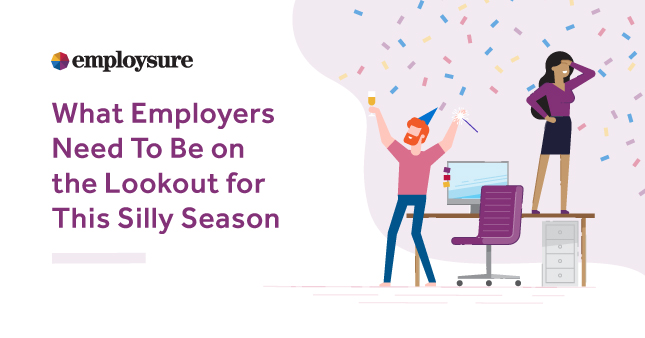
With the silly season fast approaching, now is the time to evaluate whether you are equipped to deal with the common issues most employers face at this time of the year. The silly season often means school holidays, Christmas shutdowns and Christmas parties. This is why Employsure has consolidated our key tips, in order to help employers prepare.
Employers may experience increased requests from employees who wish to take leave over this period, be it to go on holiday or to spend time with their children over the school break. As an employer, you need to be aware of how to manage requests for leave, whilst ensuring your business needs are met.
Employees who have worked for your business for a continuous 12 months or more are entitled to paid annual holidays, and have the right to take two weeks of leave at one time. Under the Holidays Act 2003, you cannot refuse an employee’s request to take leave, unless you have reasonable grounds to do so. These may include the employee failing to provide the specified amount of notice of their intent to take leave.
If your employees do not have sufficient annual leave accrued, you can agree to either of the following.
Leave in advance
You and your employee may come to an agreement whereby you allow them to take paid leave in advance. This means at your employee’s next annual holiday anniversary they will receive their leave entitlement, minus what they have already taken.
There is no legal requirement for employers to agree to employees taking leave in advance, and likewise employers cannot force employees to take leave in advance. To avoid potential issues of unfairness or inequity, it is best practice to include a predetermined policy if you would like to allow your staff to take leave in advance.
Unpaid leave
If your employee has not worked for you for a continuous 12 months and does not have leave accrued, they may request to take a period of unpaid leave.
If you agree to an employee taking a period of unpaid leave which is for a period of more than one consecutive week, you may choose to either move the date of their annual holiday anniversary to reflect the time that they took off (in excess of one week) as unpaid leave, or, not include the period of unpaid leave (in excess of one week) in their average weekly earnings.
Christmas closedowns
If your business is planning on closing shop or running on skeleton staff over the festive season, you need to be aware of how much notice you are required to provide to your employees, and how to provide this notice.
Employers are required to provide a minimum of 14 days’ notice to their employees of a Company closedown. If, during the annual closedown period, a public holiday falls on a day your employee would normally have worked, they must be paid for this day as a public holiday.
If an employee is not entitled to annual leave at the commencement of a closedown period, you must pay the employee 8% of their gross earnings since the date the employee commenced employment with your business (or the date the employee last became entitled to annual holidays), less any amount paid for leave already taken.
The employee’s annual holiday anniversary date must then be realigned to the date the closedown commenced, or a date (nominated by you) which is reasonably close to the beginning of the closedown period. This ensures that the employee will have sufficient annual holiday entitlement to cover the closedown period each year.
Christmas parties
The annual Christmas party is an event all employees and employers generally look forward to every year. It is a chance to let your hair down and mingle with your work colleagues, without the everyday stresses. However, if there is alcohol provided at the event, then this gives raise to potential risks such as misconduct and perhaps even sexual harassment if too much alcohol is consumed. Rest assured you can still hold work functions, but it is important to have the correct workplace policies and procedures in place in order to minimise the possibility of the Christmas party turning sour.
Include in your Employee Handbook a clear Code of Conduct outlining alcohol consumption and the disciplinary action that will result in the event that these standards are not met. In the Code of Conduct, make reference to behaviour at work functions. Prior to your work Christmas party, ensure employees are aware that the Code of Conduct must be adhered to. You can do this by emailing all employees a copy of the Code in advance.
As you have a duty of care to all employees, always supply food if alcohol is going to be provided and inform the venue that responsible service of alcohol must be enforced.
If you have any questions relating to employee leave entitlements, Christmas shutdowns or work functions, Employsure can help. We can assist in ensuring you are ready and prepared for this festive season, so call us today on 0800 115 047.

Get Workplace Advice Now
Call Our Team of Expert Advisers Who Will Help You with Your Workplace Questions
